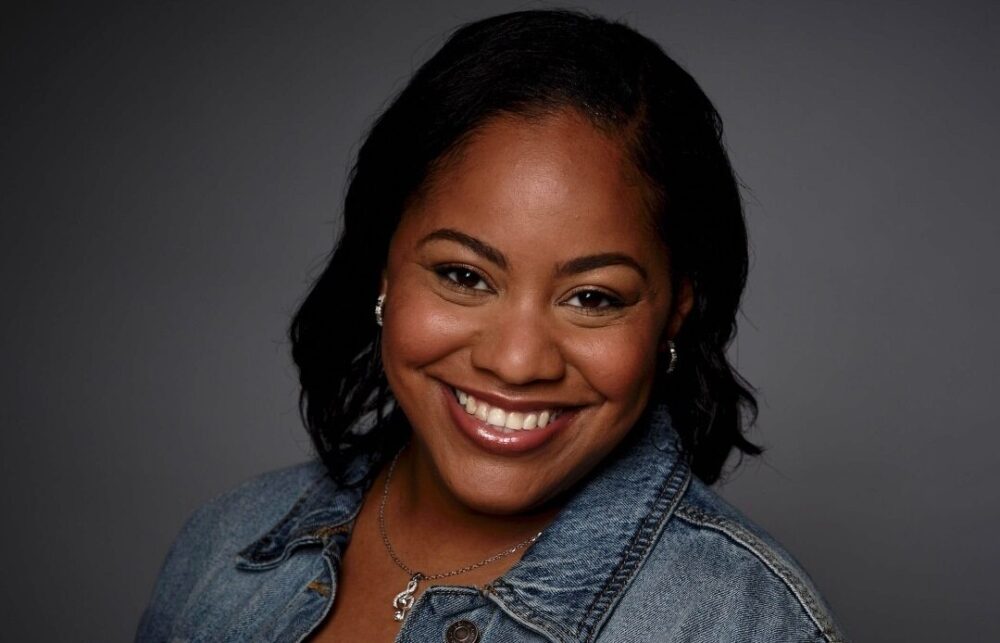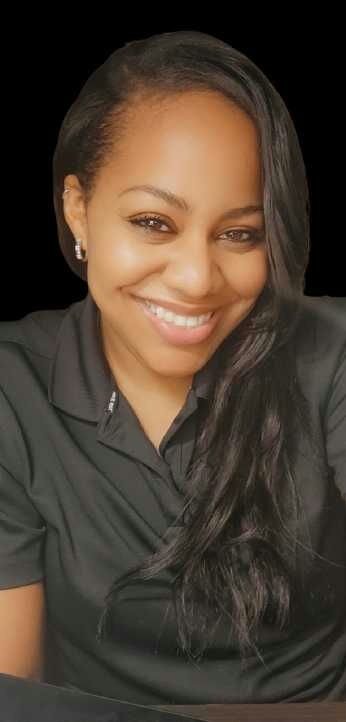Jaymie K. lives in Fort Washington, MD, where she works full-time for Planet Fitness, Taymax Group as a regional director of facilities. She works out more now post-diagnosis as a way to actively fight for her life. In addition to her passion for being active, she seeks opportunities to amplify her voice – such as hosting a podcast – and inspiring those around her to keep moving forward. Through her involvement with several lung cancer organizations, including GO2 for Lung Cancer, she shares her story with the world to help erase the stigma that lung cancer is a “smoker’s disease.”
My diagnosis
 I was diagnosed in December 2018 when I was 32 years old, after dealing with a variety of symptoms for about 8 months. For me, it started with a wheeze that became more consistent before turning into a cough. I assumed I had bronchitis, and I went to my primary care doctor, who sent me to a pulmonologist. He gave me a breathing test, which was inconclusive for asthma or other lung conditions, but he gave me an inhaler to try anyway, with instructions to come back in 2 weeks if I didn’t see any improvement.
I was diagnosed in December 2018 when I was 32 years old, after dealing with a variety of symptoms for about 8 months. For me, it started with a wheeze that became more consistent before turning into a cough. I assumed I had bronchitis, and I went to my primary care doctor, who sent me to a pulmonologist. He gave me a breathing test, which was inconclusive for asthma or other lung conditions, but he gave me an inhaler to try anyway, with instructions to come back in 2 weeks if I didn’t see any improvement.
The inhaler didn’t work, so I returned to the pulmonologist because I was still wheezing and coughing. I received a 30-day prescription for a cough suppressant, but I never heard from him or his office again. I could tell they weren’t invested in what was happening to me, so I wrote them off, too.
At the same time as all this was happening, I began kickboxing to get more exercise. I was going 5 days a week, and I started to experience back pain and shortness of breath. These were easy to explain away – the pain was from my workouts, and my shortness of breath was because I was out of shape. I didn’t think much of it and blamed it on turning 30. The turning point for me came when I was on the treadmill at the gym, and I couldn’t breathe after only a quarter mile of running. It felt like I wasn’t getting any oxygen. I knew I needed a second opinion.
My next appointment was on December 7, 2018, and the doctor asked me if I had a chest X-ray. I hadn’t. He sent me for one, and when I walked back into his office afterward, he showed me that my entire left lung was covered in fluid. Seeing just one lung while everything else was white space was shocking.
He wanted to admit me to the hospital immediately, but I told him that I needed a few days. My husband is in the military, and he was shipping out to Korea soon; plus, I had an event at work, and my cat was in the hospital. I asked if I could get through the weekend and then come back. He agreed but sent me for a CT scan to figure out whether what we were seeing was fluid or a mass. By Sunday, I started to feel sick, so I called the doctor to check on my scan results. He told me I needed to get to the hospital as soon as possible.
They admitted me, and I was there for 6 days. While there, they drained 2 1/2 liters of fluid from my chest. They tested that fluid, which came back as malignant. I had a biopsy, and after about 2 more weeks, I was told I had ALK+ lung cancer.
I had no idea what that meant at the time, but the way he delivered the news to me was so nonchalant that I left his office thinking I had a mild form of cancer and that everything was going to be fine. A couple of days before Christmas, I went in for an appointment with another doctor who said in passing that I had stage 4 (IV) lung cancer. It was the first time I’d heard that. I burst into tears because I had no idea until then that it was so serious.
Family planning
 After my diagnosis, I took a month off before starting treatment so that I could go through the IVF process to freeze my eggs. When I was first sitting with my oncologist, I thought, “What about kids?” I remember thinking how unfair the whole thing was. I had had plenty of opportunities to have kids before my cancer diagnosis, but I wanted to wait until I got married. Now, here I was, newly married, and 2 weeks later, I learned I had lung cancer. It felt like a cruel irony.
After my diagnosis, I took a month off before starting treatment so that I could go through the IVF process to freeze my eggs. When I was first sitting with my oncologist, I thought, “What about kids?” I remember thinking how unfair the whole thing was. I had had plenty of opportunities to have kids before my cancer diagnosis, but I wanted to wait until I got married. Now, here I was, newly married, and 2 weeks later, I learned I had lung cancer. It felt like a cruel irony.
The doctor said I was going to be on medication for the rest of my life and that I probably shouldn’t get pregnant while taking this medication. If having a family was important to us, freezing my eggs would be the best way to have that choice in the future.
Looking back on this now, I am still so glad we made this decision, but my perspective on having kids has changed. I think a lot about the overall impact of my life now. I’m realistic. I want to be here for a long time, but I don’t know if that will happen. So, while I’m here, I want to make the most of my years. I could have the biggest impact on a child if we adopt one who is older, who needs a good home, who will remember who I am and the influence I can have on them. I haven’t made any decisions, but that’s closer to how we think now.
Starting treatment
When I learned that I had ALK+ lung cancer, my oncologist told me that it was a very treatable and manageable form of lung cancer. He said that it’s highly researched and often very responsive to treatment. I started taking Alecensa (alectinib), and I’m still on it to this day.
Alecensa (alectinib) has been a blessing to me, and I’m incredibly grateful. It took about 2 months of weekly drains while on the treatment before the fluid came down enough that they could remove the catheter. My back pain and shortness of breath went away even more quickly. Overall, I started to feel like myself again after about a month, and I dove right back into doing everything that’s important to me–work, working out, and seeing friends and family.
Sharing my story
When I was first diagnosed, I had a radio show. I interviewed a guest who didn’t know that I had lung cancer. She had chronic health issues and said that she wanted to share her story because she felt like people should take opportunities to educate others and raise awareness.
I received her story as God saying, “Hey girl; she’s talking to you.” I heard the message. I made a live broadcast and “came out” about my diagnosis and my life with lung cancer. I have a huge network because of the radio station, and I thought I could raise a lot of awareness by sharing my news story. I shared it all – the good, the bad, and the ugly. I cried, I laughed, I let it all out, and I received incredible feedback.
Telling my story has become so cathartic to me. I’ve learned that different audiences benefit from hearing different things. I’ve become good at telling my story through different lenses, depending on what might resonate with different groups–things like fertility preservation, racism in healthcare, biomarker testing, or the importance of expanding lung cancer screening. My story can benefit different audiences in different ways, and I feel incredibly empowered by that. It’s a way to help put a real face to this disease so people understand that it can happen to anyone. You only need lungs to get lung cancer.
Connecting with the Black lung cancer community
One of the best and most life-changing parts of my experience has been my connection with other Black women living with the disease. We travel in a pack now. We’ve become real friends. Their friendships have been so important to me. One of the first things I did when I came out about having lung cancer was find other people who looked like me who were also living with lung cancer. We have this terrible thing in common, but we also have so much else in common. And those things have made dealing with and understanding this diagnosis a little easier. We genuinely like and trust each other.
I have also worked and aligned myself with companies and organizations that appreciate my perspective and experience as a Black person living with lung cancer. For example, I am now consulting with an organization as a subject matter expert in the lung cancer field. I share insights like “No, this idea isn’t going to land with the Black community” and “These are the topics that are important to us; this is how we should be looking at this.” We have to expand access to awareness, care, resources, and support so that we’re not leaving entire communities of people behind. I’m working really hard to help bring everyone along with us.
And at the end of the day, I may have cancer, but cancer DOES NOT have me.

So grateful to you for sharing my story!
You have an amazing story. Keep up the fight and continue to use your platform to inform others. You have an amazing story and an inspiration to so many who need hope and a reason to get through tough days. I am so proud of you, your courage, your strength, and your determination to beat this challenge. As always, thank you for sharing your story.
Love Mom 💕